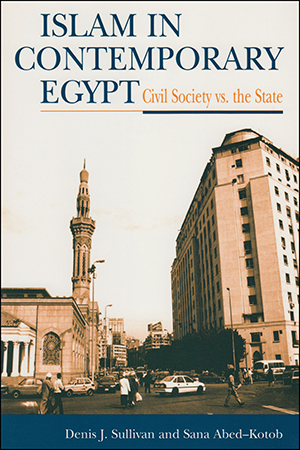Denis J. Sullivan and Sana Abed-Kotob
This unusually accessible book provides a comprehensive picture of Islam in contemporary Egyptian politics and society, emphasizing its diversity and heterogeneity.
Tracing the development of Islam as a social, political, and economic force in Egypt, Sullivan and Abed-Kotob analyze the role it plays in governance and opposition to political authority, in social relations, and in the often-ignored areas of social and economic development. They also discuss Muslim-Christian relations and women in Islam. They conclude with a consideration of the future impact of Islam on state-society relations in Egypt and on the legitimacy of the secular regime.
Denis J. Sullivan is professor of political science at Northeastern University and affiliate in research at Harvard University’s Center for Middle Eastern Studies. He is coeditor (with Iliya Harik) of Privatization and Liberalization in the Middle East and author of Private Voluntary Organizations in Egypt. Sana Abed-Kotob is on the staff of the U.S. Department of State's Bureau of Educational and Cultural Affairs.
"[A] concise and accessible introduction to the subject of Islamist movements in Egypt."—W. Judson Dorman, International Journal of Middle East Studies
"One of the most useful books on Islamic activism available today for students and a general audience.... The book describes numerous Islamist organizations within Egypt, analyzes the strengths and failures of various Islamist initiatives, describes the role of women in the Islamist phenomenon, and provides a useful critique of the Egyptian government's policies toward its citizens and, especially, Islamist organizations. It is highly recommended."—Vernon Egger, Journal of Third World Studies
"An important contribution to the growing body of literature examining civil society in the Middle East."—W. Lynn Rigsbee II, Digest of Middle East Studies
"This is a very clear and well-organized book on an important subject."—Peter Woodward, Journal of Modern African Studies
"A remarkably reliable, accessible, and dispassionate account of the very complex relationship of Islamic political movements and Egypt’s authoritarian regime.... informative and engrossing."—Raymond W. Baker






